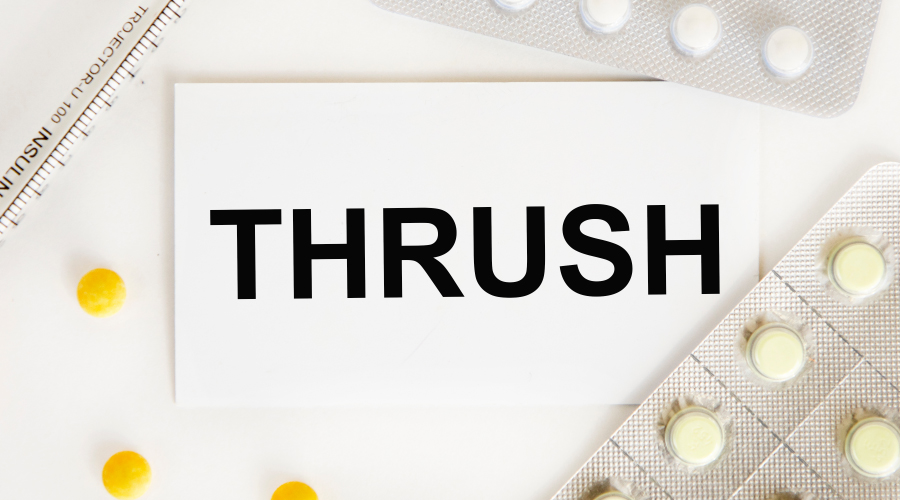

Oral thrush, or oropharyngeal candidiasis or oral candidiasis, is a condition marked by a mouth-growing fungus. A small amount of fungus is normal in the oral cavity but an overabundance can cause a yeast infection. While adult cases of oral thrush are usually benign and readily treated, those with compromised immune systems may develop complications if the infection spreads to other body areas.
Symptoms of Oral Thrush in Adults
Creamy or white lesions on the tongue, inner cheeks, roof of the mouth, gums, or throat are typical signs of oral thrush. Other associated symptoms of oral thrush include:
- Affected areas may be tender, resulting in pain or a burning sensation, mainly when eating or drinking.
- Oral thrush can make swallowing difficult and cause a sensation of food being stuck in the throat.
- There’s a persistent metallic or bitter taste in the mouth.
- Because oral thrush causes a decrease in saliva production, it causes a dry sensation in the mouth.
- In addition to white patches, the surrounding areas may appear red or swollen.
- When scraped or brushed, the patches of oral thrush may crack or bleed.
What Causes Oral Thrush?
Lack of oral hygiene, such as infrequent brushing and flossing, is the main trigger factor of oral thrush in adults. The other reasons that cause the oral fungus to multiply are:
- Weakened Immune System – A compromised immune system due to conditions such as HIV/AIDS, cancer, or autoimmune diseases can make individuals more susceptible to oral thrush.
- Medications – Certain medications, such as antibiotics, corticosteroids, and immunosuppressants, can disrupt the normal oral flora, allowing Candida to overgrow.
- Diabetes – Uncontrolled diabetes can create an environment in the mouth that promotes Candida growth.
- Smoking – Tobacco use and smoking weaken the immune system and can increase the risk of oral thrush.
- Dry Mouth – Saliva helps maintain a healthy balance of microorganisms in the mouth. Decreased saliva production, often due to certain medical conditions or medications, can create an environment conducive to Candida overgrowth.
- Dentures – Dentures that are ill-fitting or not cleaned regularly can create an environment where Candida can thrive.
- Underlying Medical Condition – Conditions like iron deficiency, vitamin B12 deficiency, and hypothyroidism can make it conducive for the growth of Candida.
Oral Thrush Diagnosis
Diagnosing oral thrush in adults typically involves a combination of visual examination and sometimes additional tests. Here are the common methods used to diagnose oral thrush:
Visual Examination
A medical practitioner will visually examine your oral cavity to find telltale indications of oral thrushes like creamy or white patches on the tongue, inner cheeks, or other oral tissues. Usually, a tongue depressor provides a clearer view of the back of the mouth.
Swabbing or Scraping
In certain instances, a medical practitioner might gently scrape or swab the afflicted areas to obtain a sample for additional examination. The presence of Candida fungus is then determined by looking at the sample under a microscope.
Treatment for Oral Thrush in Adults
The following are the most popular ways for oral thrush treatment:
1. Antifungal Mouthwash or Oral Tablets
Over-the-counter mouthwash or lozenges containing antifungal agents like nystatin or clotrimazole can relieve mild to moderate cases. Typically, these drugs are swished all over the mouth to eradicate the fungus gradually.
2. Antifungal Medications
In more severe or persistent cases of oral thrush, the healthcare provider may prescribe oral antifungal medications, such as fluconazole. These medications work systemically to combat the fungal infection throughout the body.
3. Treating Underlying Conditions
If an underlying condition, such as diabetes or immunodeficiency, contributes to the development of oral thrush, it is important to address and manage that condition to prevent recurrent infections.
Is Oral Thrush Preventable?
Some preventive measures include:
- Maintain Good Oral Hygiene: Use fluoride toothpaste and a soft-bristled toothbrush to brush your teeth at least twice daily. Also, use a tongue scraper to clean your tongue regularly.
- Rinse Your Mouth: To reduce the risk of oral thrush, rinse your mouth thoroughly with water after taking inhalers for asthma or corticosteroids for respiratory conditions.
- Denture Cleaning and Maintenance: If you wear dentures, then clean and soak them daily as per the directions. Ensure they fit correctly and take them off at night so your mouth can relax.
- Handle Underlying Health Conditions: To help preserve a robust immune system and lower the risk of oral thrush, manage any underlying health condition, such as diabetes, or immunodeficiency disorders.
- Restrict Antibiotic Use: Antibiotics can upset the delicate balance of microorganisms in your mouth, so only use them when necessary.
- Give Up Smoking: If you smoke, then give it up since it compromises your immune system and raises your risk of oral thrush.
Home Remedies for Oral Thrush
Even though they might not replace medical care, some people might find that using some home remedies can help them manage their oral thrush symptoms. Several widely used home remedies for oral thrush consist of:
- Saltwater Rinse: Several times a day, rinse your mouth with warm water with half a teaspoon of salt.
- Yoghurt: Eating plain, unsweetened yoghurt with live cultures of lactobacillus acidophilus, a beneficial bacteria, can help balance the microorganisms in the mouth.
- Coconut Oil: Rubbing the afflicted mouth regions with coconut oil may help lessen the symptoms of oral thrush. With its antifungal qualities, coconut oil can offer some comfort.
- Tea Tree Oil: Use a few drops of diluted tea tree oil as a mouthwash by diluting it with water. Due to its antifungal qualities, tea tree oil may be able to fight the Candida fungus.
- Probiotic Supplements: Probiotic supplements containing beneficial bacteria may help restore the natural balance of microorganisms in the mouth.
Conclusion
An overabundance of Candida fungus in the mouth brings on a common fungal infection called oral thrush. This may lead to symptoms like white patches, soreness, changed taste, and trouble swallowing.
Prevention is as important as treatment; antifungal medications and proper oral hygiene practices are two options. Adult cases of oral thrush can be decreased by practising good oral hygiene, taking care of underlying medical issues, and reducing specific risk factors. Furthermore, some people may benefit from using natural treatments for oral thrush, like yoghurt, coconut oil, tea tree oil, probiotic supplements, and saltwater rinses.
If symptoms worsen or persist, then you should see a medical professional for an accurate diagnosis and treatment of oral thrush.




